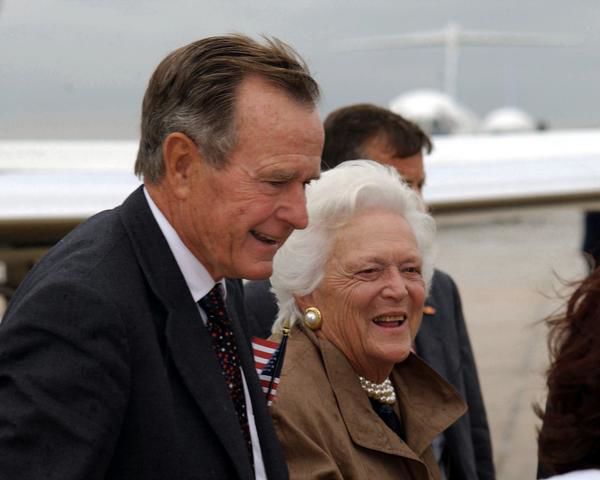A look back at President George H. W. Bush’s legacy

Courtesy of Wikimedia Commons
December 1, 2018
George H. W. Bush, America’s 41st president and the father of an American political dynasty, died at age 94 on Friday night.
Born in 1924, he was the seventh and final president to serve in World War II. He was a naval aviator during the war and survived his aircraft being shot down over the Pacific Ocean.
Bush was preceded in death by his wife of 73 years, Barbara Bush, earlier this year. He is survived by their children: Jeb, Neil, Marvin, Doro and George Bush Jr.
Public service before presidency
Before ascending to the presidency in 1989, Bush had more than 20 years of experience in public service. He served as a U.S. Representative for Texas from 1967 to 1971. Afterwards, then-President Richard Nixon appointed him as an ambassador to the United Nations.
Bush served as an ambassador for two years before becoming chairman of the Republican National Committee in 1973. Though he’d been an avid supporter of Nixon, Bush eventually penned a letter to the president asking him to stand down.
His political career stretched on. Bush served on a political envoy to China and as the Director of Central Intelligence before Ronald Reagan selected him as a running mate for the 1980 presidential election. Reagan was elected in 1981, and Bush served as vice president for two terms.
Bush was a well-known politician by the time he was elected president in 1989.
The Gulf War and the invasion of Panama
Bush famously presided over the invasion of Panama in his first year of presidency. He deployed thousands of U.S. troops to execute an arrest warrant for war criminal, dictator and former CIA ally Manuel Noriega.
Noriega was tried for his crimes in Florida. According to the U.N., around 500 Panamanian civilians died in the invasion, but the U.S. never formally conducted its own investigation. After standing trial as a prisoner of war, Noriega was sentenced to 40 years in prison, which was eventually lessened to 17.
After Noriega’s incarceration, another former CIA ally was causing trouble. This time it was Saddam Hussein in the Middle East. Hussein, then the leader of Iraq, invaded the oil-rich and neighboring country of Iraq.
In response, Bush increased U.S. troop presence in the region by the thousands. The U.S. bombed Baghdad and launched a land invasion of Iraq, eventually resulting in the Hussein’s surrender.
It wasn’t just the U.S. that got involved. Bush assembled a coalition of more than 30 countries to bring an end to the Iraqi invasion of Kuwait. The conflict is known as the Gulf War, or Operation Desert Shield.
Along came Bill Clinton
Bush lost his second election race to then-Senator Bill Clinton. It has been said that Bush’s downfall came along his first campaign trail in 1988 when he famously said, “Read my lips: No new taxes.” This promise came back to haunt him.
“That was the end of him, in some ways,” said Jacob Minock, president of Iowa State College Republicans and junior in mechanical engineering. “When you promise no new taxes, and then it happens, you have to own up to it.”
Iowa State College Republicans issued a statement on Twitter honoring Bush’s legacy.
“You might not agree with his policies, but you can’t deny he was trying to do the best for his country,” Minock said.
Taylor Blair, president of Iowa State College Democrats and junior in industrial design, offered the Daily a statement in the former president’s passing.
“We lost a great public servant yesterday and my thoughts are with his family,” Blair said.
Being remembered
Countless people took to Twitter and other social media outlets to voice their dismay at Bush’s death. This included Clinton, his one time political adversary. Years after the 1992 election, Clinton and Bush became good friends. They even volunteered side-by-side in the wake of a devastating tsunami in South-East Asia, and again in the aftermath of Hurricane Katrina.
Some say that the seed for this friendship was planted the day Clinton stepped into the Oval Office and found a letter from Bush. It wished Clinton luck in his upcoming presidential term.
“It’s a refreshing story,” Minock said. “It reminds me of a different time in politics, where, instead of attacking people, we actually talked about ideas.”
Clinton issued an official statement in the wake of his friend and former adversary’s death.
“Few Americans have been—or will ever be—able to match President Bush’s record of service to the United States and the joy he took every day from it,” the statement read.















